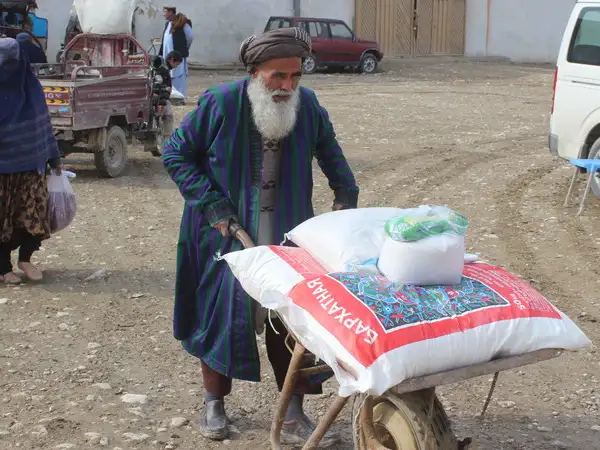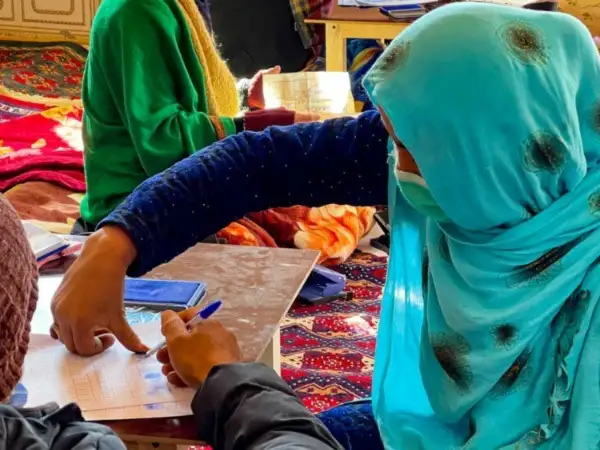Afghanistan Crisis Appeal
Your support will help us reach vulnerable people caught up in this crisis.
The humanitarian situation in Afghanistan continues to deteriorate, and millions of people face hunger and extreme poverty. Their situation has been made worse by the Taliban takeover and by the recent earthquakes that hit the country on 22 June 2022 and 7 October 2023.

Afghanistan was hit with another powerful earthquake on 7 October. The 6.3-magnitude earthquake and the subsequent aftershocks have devastated at least 12 villages in western Afghanistan, killing over 2,000 people and injuring thousands more.
The worst-affected communities are remote and consist of mud structures which have been destroyed, resulting in many Afghans finding themselves homeless or unable to access basic needs and rights. Our local partners are currently assessing the needs and preparing to respond as soon as it is safe to do so.
Over half the country’s population – around 24.4 million people – are in need of humanitarian assistance, the UN World Food Programme (WFP) has warned. More than eight million people are on the brink of famine, with a million children under the age of five at risk of dying.
The situation in Afghanistan is highly complex with decades of conflict that have taken a terrible toll on Afghan people, resulting in deaths, injuries and pushing families further into poverty. Drought and coronavirus have added even greater problems for vulnerable families struggling with hunger and healthcare. Prices were already escalating, but the situation in Ukraine has made this even worse.
On 22 June 2022, a powerful 6.1 magnitude earthquake hit the south-eastern region of Afghanistan killing at least 1,000 people, injuring more than 1,500 people, and destroying thousands of homes.
“The Afghan people cannot bear another tragedy. Millions of people in the country are already struggling to survive due to the deep economic and social crisis following the takeover of power by the Taliban in August 2021, which compounded periods of drought, decades of conflict, the Covid-19 pandemic and has been made worse by the surge in food prices due to the conflict in Ukraine.”
Before the earthquakes our local partners were already providing food packages and cash assistance to vulnerable families across the country, and in particular some of the most hard-to-reach mountainous regions.
We continue to support Afghans who have urgent humanitarian needs – both within Afghanistan and in neighbouring countries – whilst also continuing to provide longer-term support. CAFOD's local partner is already on ground and assessing the needs of those affected by the recent earthquake.
“As with all humanitarian disasters, it is the local community who will be the first responders. The staff from our local partners are all safe – but our prayers are with them, and other survivors who will be doing all they can over the coming days to help save lives and support those who would have lost loved ones, their homes and their livelihoods.”
We work with trusted partners who are close to the communities they serve and are therefore able to ensure your donation securely reaches those who need it most.
CAFOD started working in Afghanistan in the late 1980s and a core part of our work has been to support Afghan organisations committed to improving the lives of vulnerable and marginalised people, supporting them to earn a living.
After the 2021 earthquake, our local humanitarian experts were providing short-term cash assistance and emergency food packages to more than 8,000 small-scale farming families - approximately 60,000 people - in over 50 of the most drought-affected villages in the country to allow them to buy basic food for their families and plant their crops for next season.
We are also working with women’s organisations to ensure that women and girls can participate fully in all our programmes.
Your support will help us reach vulnerable people caught up in this crisis.
Pray for peace in Afghanistan and throughout the world.


The food packages were designed to last a family for around two months.
Pope Francis has expressed his “unanimous concern for the situation in Afghanistan”. He called for prayers “so that the clamour of weapons may cease, and solutions may be found at the negotiating table".
The leader of the Catholic Church in England and Wales, Cardinal Vincent Nichols, has called on the UK government to allow more refugees to come to the UK in light of the situation in Afghanistan.
In a joint letter to the Guardian newspaper on 26 August 2021, Bishop Paul McAleenan, lead bishop for migrants and refugees of the Catholic Bishops’ Conference of England and Wales, urged the British government "to go further in helping at-risk Afghans, human rights defenders and women activists, and create safe passages so that people can find sanctuary without resorting to dangerous journeys.”
Many commercial banks now have limited opening, but the situation is still difficult. We are taking careful steps to ensure that our funds reach our partners safely so that they can reach the people in greatest need.
Any money transferred to the partners we work with will be done so securely and safely. CAFOD has a robust due diligence, monitoring and verifying process to ensure that donations reach their intended purpose.
This can mean it takes much longer than usual for our funds to reach our partners, but with good planning our partners are able to ensure the work on the ground continues.


An Afghan woman receives cash assistance for her family.
Vital work by our partners has resumed inside Afghanistan. In a changing and uncertain situation, we are also doing everything possible to ensure the wellbeing of local partners and the communities they serve.
Catholic sister agencies are already providing humanitarian aid to affected families in some of the most remote areas of Afghanistan and we are also working with them.
Janet Symes said:
"We are working through organisations in Afghanistan who are getting cash assistance to people in very remote areas, including some of the mountainous areas.
"One partner involved in the cash distribution told me how as soon as people were getting their cash distributions they were going directly to the market to be able to buy food or fuel for their family - to keep their family alive. As a result of people’s generosity, we have been able to start making a difference."
“As a result of people’s generosity, we have been able to start making a difference.”
CAFOD's Afghanistan Crisis Appeal will ensure that the most vulnerable people in Afghanistan will be assisted based on a thorough needs assessment. On top of the priority list will be older women, women headed households, people with disabilities, pregnant and breastfeeding women. Women are always disproportionately affected in humanitarian situations and in Afghanistan women have again been disproportionately affected by escalating conflict, Covid-19, floods and droughts, earthquakes and the resulting poverty.
The impact of a Taliban-governed Afghanistan on women’s ability to go to work with guarantees of safety are still unclear. We will only support programmes that ensure women have full access; we are keen to ensure our local partners’ female staff are able to continue their work.
Your support will help us reach vulnerable people caught up in this crisis.
Pray for peace in Afghanistan and throughout the world.